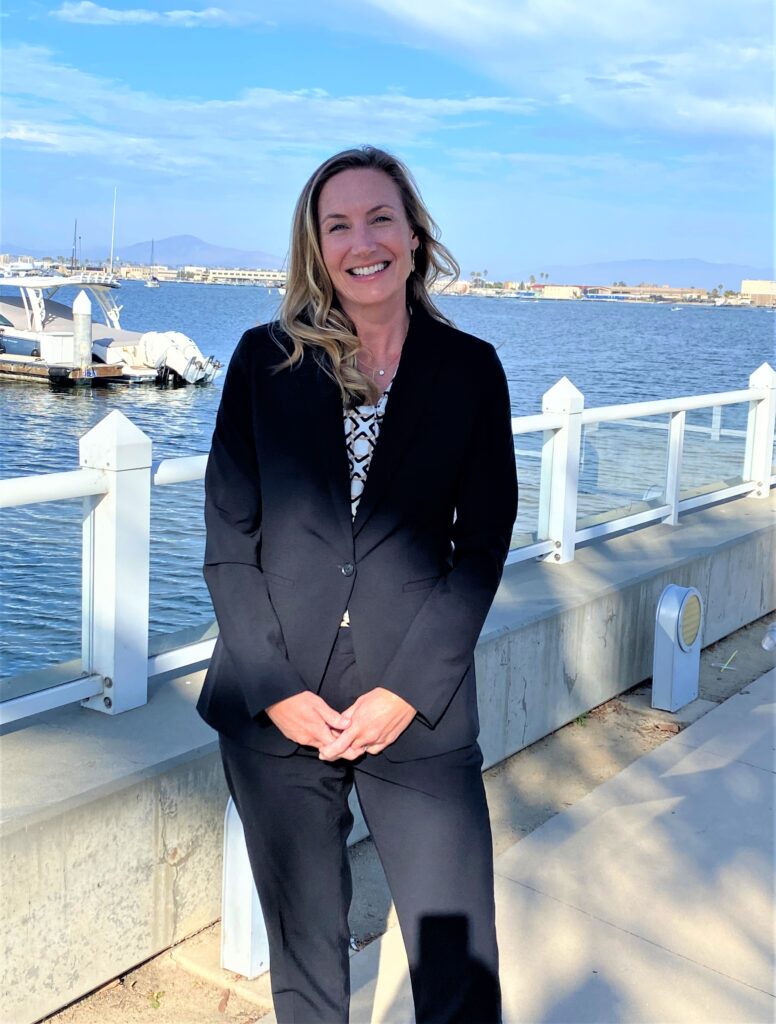
Saying hello to a new city manger and farewell to two dedicated employees were highlights of the City Council meeting. After a search with 60 candidates, Tina Friend was unanimously approved as the new city manager. Friend comes from Scotts Valley, CA, where she served as city manager and was previously the assistant city manger for Santa Cruz, CA for nearly a decade. She holds a law degree from Santa Clara University School of Law, a master’s degree in Public Policy from Georgetown University and a bachelor’s degree from the University of Idaho. He highlighted that she her experience with coastal governments will be a plus for Coronado. Her exact start date isn’t set but is expected to be early September.
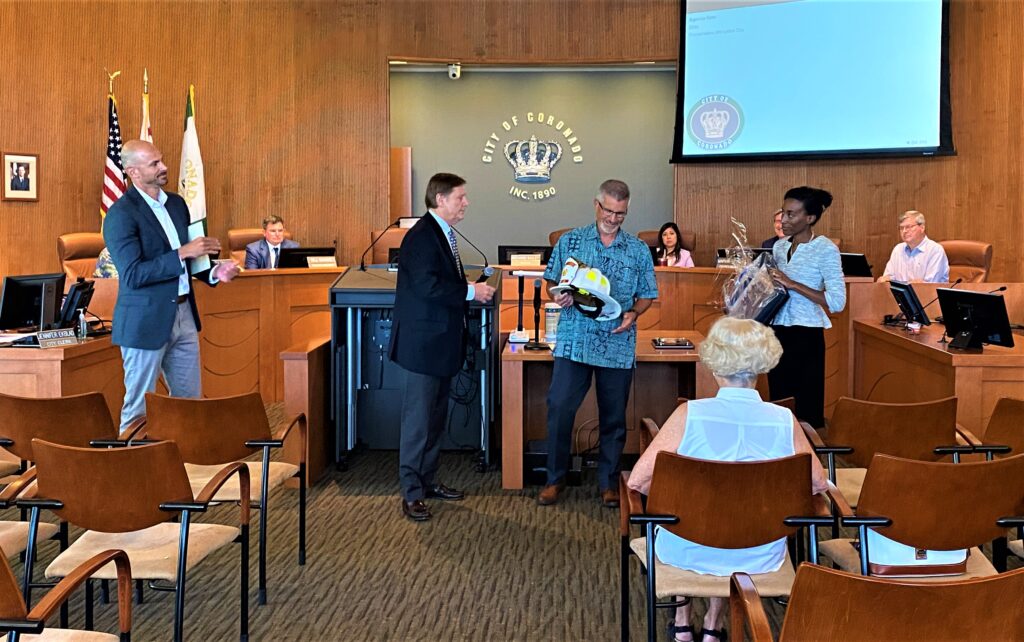
Mayor Bailey proclaimed July 20, 2021, as Jim Lydon Day, as the Fire Chief retires after four years of service here. His more than 40 year career started in 1979 in San Rafael and included the communities of Benicia and Coronado. He is credited with improving community safety as he led emergency operations during the pandemic. The mayor noted that during his tenure he upgraded and expanded the equipment and fire station and handed him a key to the city. Interim City Manager Mark Ochenduszko gave him an honorary fire helmet and Assistant City Manager Dominique Albrecht presented him with a plaque and floral bouquet. Former Chief Mike Blood was approved as Interim Director until a new chief is appointed.
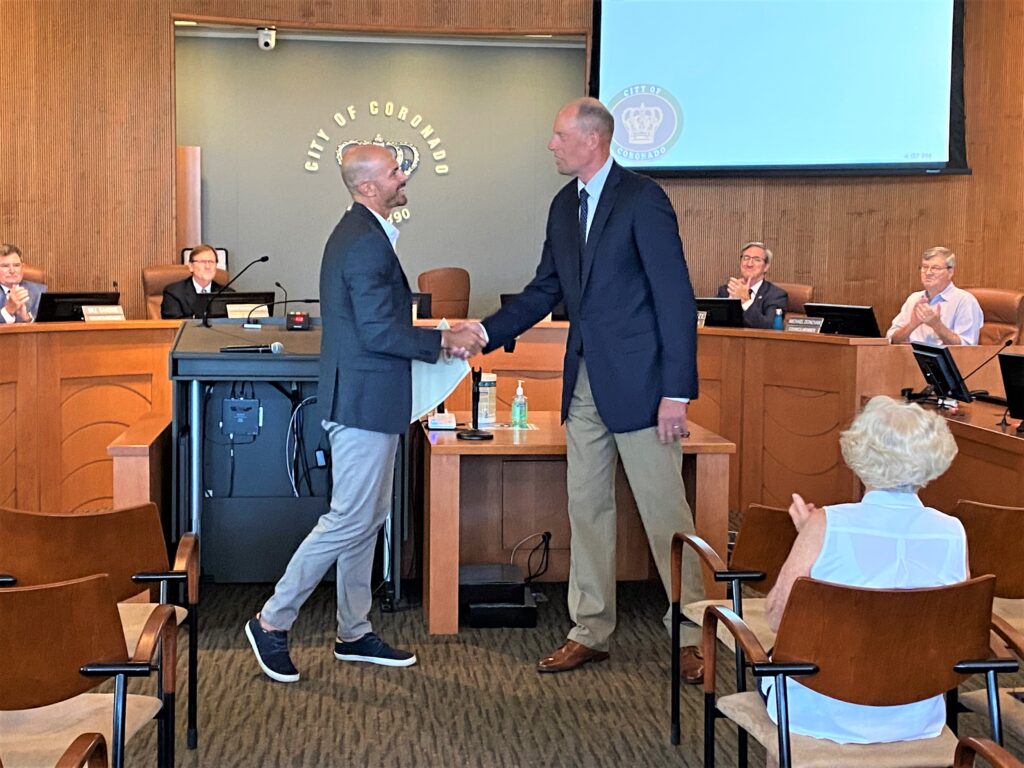
Another farewell was given to Director of Public Services and Engineering Cliff Maurer as he leaves to join the city of Santa Barbara as Public Works Director. When Mayor Bailey proclaimed July 22, 2021, as Cliff Maurer Day, he emphasized Maurer’s tireless leadership in integrating the Public Services and Engineering Department into a cohesive team. Among his many accomplishments was establishing an in-house architectural team which added significant internal design capacity. As the mayor gave Maurer the key to the city, Maurer joked that he has many city keys, but this is the only one that doesn’t open anything. Former Director Scott Huth was appointed as Interim Director until a new director is appointed.
In the City Manager’s Report, Mark Ochenduszko introduced new Management Analyst Kara Casey. He also thanked Coronado Fourth of July President Todd Tanghe, city staff, especially police and fire personnel, for their dedication to making this year’s Fourth of July celebrations outstanding, as well as safe for the community. He gave an update on the Cays Park Master Plan and noted that a Cays resident conducted a survey of 500 residents and shared the findings with the city. Next steps include compiling the data, hosting a public workshop, reviewing input, and then developing general concepts for approval. He also mentioned that restaurant outdoor seating has been extended through the end of September, and the city is monitoring vaccination levels and working to get back to a normalized environment. As an update to the Parker Pump Station, he noted that it is in the design phase, with the property at 800 Coronado Avenue in escrow. He pointed out that the 6000 square foot community park is an added enhancement bonus for the city.
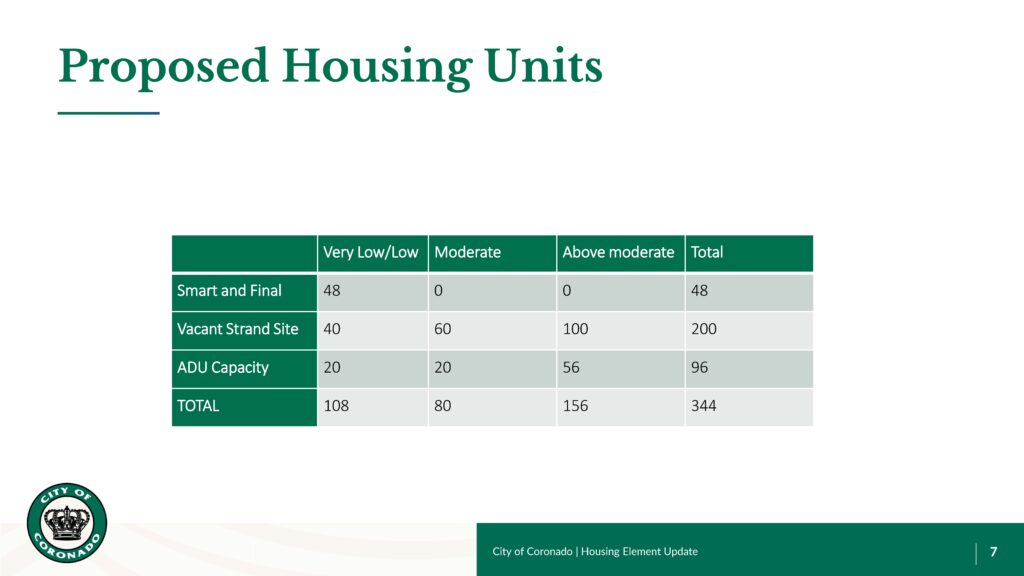 The 2021-2029 Housing Element Update was presented by Senior Planner Jesse Brown. The city is currently in litigation on this matter, due to what the City calls “unreasonable” 912 new dwelling units mandated by SANDAG. Brown illustrated the plan that will accommodate 344 new residential units through ADU development as well as housing on two sites. The first is the 2.4 acre Smart and Final site, located at 150 B Avenue, where 48 units are proposed. The second is the 39 acre vacant strand site for 200 total units, with an additional 96 units coming from ADUs. Councilmember Donovan pointed out that everyone needs to be aware and protest the passing of Senator Toni Atkins SB 9 Bill which allows the building of four units on a single lot.
The 2021-2029 Housing Element Update was presented by Senior Planner Jesse Brown. The city is currently in litigation on this matter, due to what the City calls “unreasonable” 912 new dwelling units mandated by SANDAG. Brown illustrated the plan that will accommodate 344 new residential units through ADU development as well as housing on two sites. The first is the 2.4 acre Smart and Final site, located at 150 B Avenue, where 48 units are proposed. The second is the 39 acre vacant strand site for 200 total units, with an additional 96 units coming from ADUs. Councilmember Donovan pointed out that everyone needs to be aware and protest the passing of Senator Toni Atkins SB 9 Bill which allows the building of four units on a single lot.
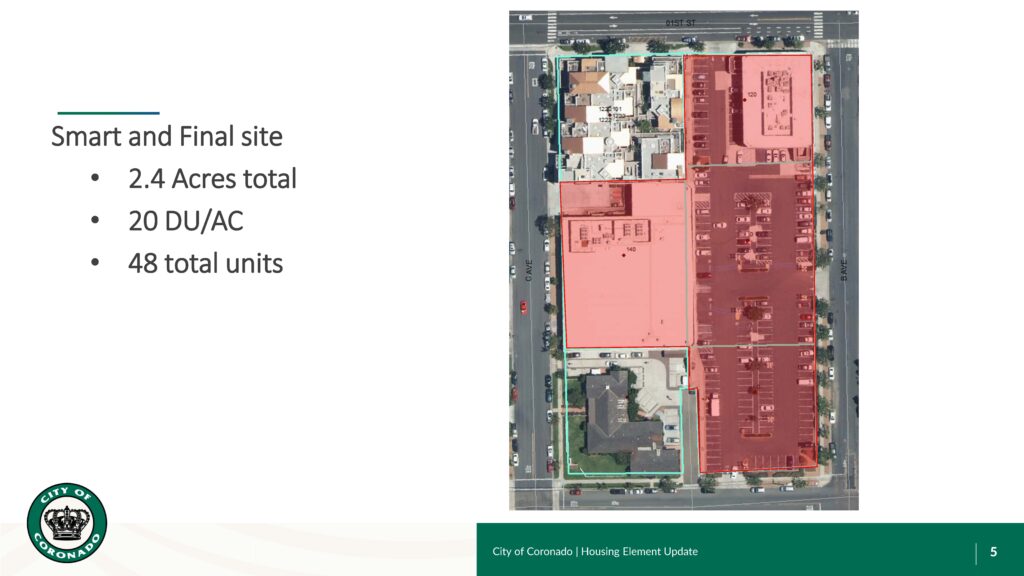
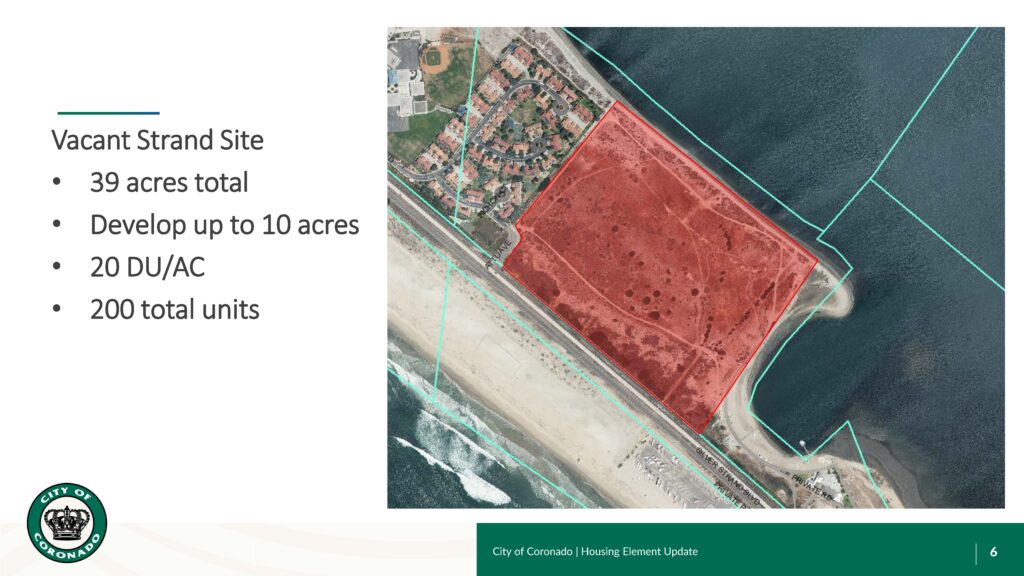 Councilmember Heinze felt that the city has “done its best to comply with goals while being reasonable for the city.” Mayor Bailey said, “This is the best of no good options,” as he moved for approval of the plan, which was unanimously approved, with Councilmember Tanaka voicing his reluctancy on the Smart and Final site selection.
Councilmember Heinze felt that the city has “done its best to comply with goals while being reasonable for the city.” Mayor Bailey said, “This is the best of no good options,” as he moved for approval of the plan, which was unanimously approved, with Councilmember Tanaka voicing his reluctancy on the Smart and Final site selection.
Director of Engineering Ed Walton gave an update on the undergrounding project along first Street between D Avenue and Alameda Blvd. He said that 80 homes have signed up for the assessment district and the initial cost proposed by Harris & Associates was $8.6 million, well above the average undergrounding cost of $1000 per linear foot. The reason for this is the double trenching needed for the two circuits, one for residential and the other for the Navy. Walton said they went back to SDG&E and came up with a compromise, where a single trench could hold both circuits, bringing the cost down to $6.1 million.
He noted that their assessment methodology includes three components:
- Improved aesthetic = 65 percent weighted
- Added safety = 20 percent weighted
- Reliability and connection = 15 percent weighted
Walton posed the question to Council if the proposed 50/50 match should be used, or less for the residents, since this is a higher than average district due in part to the naval component. Councilmember Sandke asked if the Navy could be asked to contribute towards their dedicated circuit but was told that the Navy is unwilling to participate. Councilmembers Heinze and Donovan pointed out errors in the formulation costs presented to residents and asked Walton to get revised numbers out as soon as possible. Councilmember Tanaka asked what contingency percent was built into the $6.1 million project and was told 20 percent. He wondered if it should be more, perhaps 30 percent, with the rising cost of materials.
After discussion, the council approved the project with the city contributing the additional $1 million to cover the Navy circuit costs, and leave the 50/50 split with resident cost, equating to approximately $23,000 per parcel, excluding new construction parcels which are already undergrounded. Councilmember Tanaka voted no, because he said that undergrounding was not a good use of public funds and not fiscally prudent.
Tennis was the topic of Director Recreation and Golf Services Director Roger Miller’s presentation. He noted that Coronado has four tennis court facilities with eight courts at the Coronado Tennis Center, five at the Coronado Cays, two next to the Library, and four at the CUSD Robbin Adair Tennis Complex on D Avenue. These have been managed by Impact Activities since May 1, 2021, who pays the city a $50,000 yearly fee. Miller proposed a Regional Tennis Fee Study and to then develop a comprehensive fee structure and balanced court use program. He cited other comparable private and public facilities: University City Racquet Club, Pacific Beach Tennis Club, San Diego Tennis/Racquet Club, Peninsula Tennis Club, Barnes Tennis Center, and Balboa Tennis Center.
The study would also seek public input and seeks to accomplish, with the top three highest priority:
- Providing greater court access to residents
- Proving more diverse access choices, i.e., membership/passes
- Review junior access
- Review and develop a court use program that is fair and equitable in the distribution of court time for reservations, free walk-ons, and use groups
- Develop a new fee structure
- Develop a facility use program that is comprehensive, clear, and concise
Councilmember Tanaka pointed out that he has received lots of negative input from people who feel they were excluded from the previous decisions and was adamant about soliciting public input. “Let’s try to win these people over,” he commented. Councilmember Donovan brought up the growing popularity of pickleball and asked that it be included in the analysis to which the council agreed and unanimously approved.
Councilmembers Tanaka and Heinze volunteered to be on an Ad Hoc Subcommittee to participate in the Winn Room needs assessment workgroup to help move this project forward after previous renderings were not approved.
Several items were added and pulled from the Consent Calendar. The Ocean Blvd. Improvements Project and the yield sign on Ocean Blvd at the Naval Air Station North Island Gate 5 exit were removed to be addressed at a later date. The Sea Level Rise Vulnerability Assessment was added and approved. Allowing nonmotorized bikes in the Skatepark was also approved to move forward via consent. Eddie Reynolds, who the mayor praised for spearheading the effort, spoke and thanked the council, noting that he didn’t feel that separate sessions for skaters and bikers were necessary, but was happy for the consideration.
Related:




